The proportion of Americans who say that it is the government’s responsibility to ensure health care coverage for all has reached a nearly two-decade high, new polling finds.
According to a Gallup survey released Monday, 62 percent of Americans now say that the federal government should ensure that all Americans have coverage, versus 36 percent who say it should not. Support is highest among Democrats, with 90 percent approving of the idea, though support has risen in the past decade among independents and Republicans, among whom support is currently at 65 percent and 32 percent.
This is the highest proportion of Americans who agree with guaranteed federal health coverage since 2007, when 64 percent of Americans said as such. Then, health care was a major touchpoint in the upcoming presidential election as millions lost their health insurance amid the Great Recession.
Support for federally ensured health coverage reached a low in 2013, as Republicans levied a fierce effort to repeal the Affordable Care Act (ACA), backed by lobbyists representing major private health insurers. Gallup found that support for the ACA is near its all-time high, at 54 percent approval.
The polling results suggest that the public could be easily swayed to support proposals like Medicare for All. It comes as many regular Americans are struggling to get by, with health care costs rising across the U.S.
According to the poll, 46 percent of Americans agree that the health care system should be run by the government, while 49 percent say it should be based mostly on private insurance, as with the current system.
This is the smallest margin between the two opinions since 2017 — after the 2016 election in which Sen. Bernie Sanders (I-Vermont) ran on a platform including Medicare for All — despite universal health care having been highly politicized by conservatives and lobbyists.
Support for a government-run health care system is highest among Democrats, with 71 percent saying they prefer such a system. But the polling found that Republicans are increasingly favoring a government-run option as well, with the idea having gotten a double-digit gain in support among the group in the past decade, now at 21 percent.
The U.S. is the only wealthy country in the world without universal health coverage. As a result, the U.S. spends by far the most on health care as a proportion of GDP while having by far the worst health outcomes of any peer country, research has found.
According to research this year by the Commonwealth Fund, the U.S. has the highest barriers to accessing care by metrics of affordability and availability, while Americans have the shortest life expectancy at birth and the most avoidable deaths of peer countries like the U.K., Australia and Canada. Meanwhile, government inquiries have found that prices for prescription drugs in the U.S. are far higher than they are in other peer countries, sometimes by an order of magnitude.
Roughly 8 percent of Americans, totalling over 26 million people, don’t have health insurance, while a 2022 survey by the Commonwealth Fund found that about a quarter of Americans are underinsured, meaning that they have coverage plans that don’t give them access to affordable care.
This is in part due to rampant corruption and abuse by private health insurers like UnitedHealthcare, which investigations have found has created a complicated playbook to deny claims for customers paying thousands each year for coverage.
Angry, shocked, overwhelmed? Take action: Support independent media.
We’ve borne witness to a chaotic first few months in Trump’s presidency.
Over the last months, each executive order has delivered shock and bewilderment — a core part of a strategy to make the right-wing turn feel inevitable and overwhelming. But, as organizer Sandra Avalos implored us to remember in Truthout last November, “Together, we are more powerful than Trump.”
Indeed, the Trump administration is pushing through executive orders, but — as we’ve reported at Truthout — many are in legal limbo and face court challenges from unions and civil rights groups. Efforts to quash anti-racist teaching and DEI programs are stalled by education faculty, staff, and students refusing to comply. And communities across the country are coming together to raise the alarm on ICE raids, inform neighbors of their civil rights, and protect each other in moving shows of solidarity.
It will be a long fight ahead. And as nonprofit movement media, Truthout plans to be there documenting and uplifting resistance.
As we undertake this life-sustaining work, we appeal for your support. Please, if you find value in what we do, join our community of sustainers by making a monthly or one-time gift.
